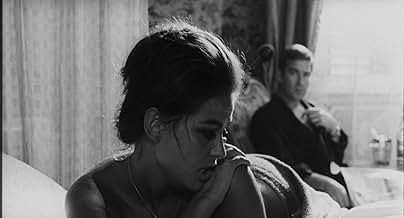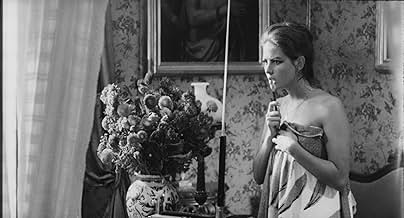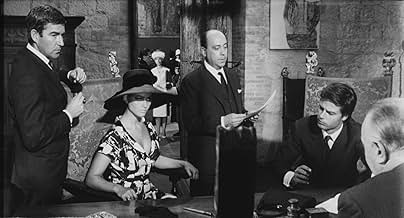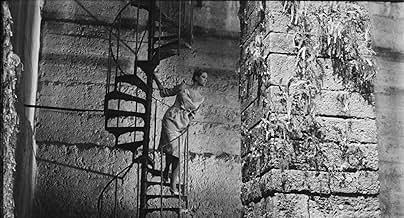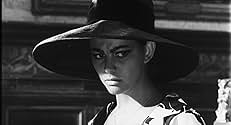IMDb RATING
7.1/10
2.4K
YOUR RATING
Sandra returns to her childhood village to take care of family business, but her childhood memories and secrets soon overcome her.Sandra returns to her childhood village to take care of family business, but her childhood memories and secrets soon overcome her.Sandra returns to her childhood village to take care of family business, but her childhood memories and secrets soon overcome her.
- Awards
- 3 wins & 2 nominations total
Oscar Brazzi
- Party Guest
- (uncredited)
Glenn Saxson
- Party Guest
- (uncredited)
Featured reviews
After watching "Sandra...", for the first time in mi life I wanted to know who the director was. It was 1966 and me 15, so until that moment, I was only interested in who starred what but never fully understood the director's work enormous importance. Since then, Visconti not only became one of my favorite directors ever but a parameter when judging a film. Actually, I had seen The leopard years before, when I was to young to notice more than the beauty in Cardinale and the sumptuous sets. About "Sandra" I still remember vividly not only how beautiful and glamorous Cardinale looked but how handsome and elegant Sorel was; how mysterious the whole black and white atmosphere was and the intriguing plot... which I didn't fully understood because even if the action seemed to say something, the subtitles said something else!. I thought then my mother was right when she used to tell me: You are too young to understand this and that. Well, not without relief, I learn, years later, than the subtitles had been made in Spain, during the Franco's days, so its censorship had erased all incest traces. After that, a new copy was made to match subtitles and story (and thats, thankfully, what you can find, at least in Spanish!). But even after so many years, and in my adulthood, I find Sandra as magical as the first time and still is one of my favorite movies, as many Visconti's works like Rocco and his brothers, Death in Venice or The dammed, as well, of course, The Leopard.
I am sick to death of all the ridiculous titles this great film has been given. ' Of A Thousand Delights ' is absurd meaning nothing and ' Sandra ' is banal. To make it clear the title is a reference to a Leopardi poem eloquently quoted by Jean Sorel in the film. The poem expresses despair, and Jean Sorel says the words to his sister Sandra played by Claudia Cardinale. Why is he in despair ? He is in love and that love is forbidden by society. His suffering is appalling to watch, and given that Luchino Visconti was homosexual Sorel's beautiful face and body is filmed erotically, and the film could have been called ' Gianni,' given that Sorel as well as Cardinale are our main focus of attention. But of course that would not have brought the audience in. Other reviewers have given away a lot of the story so I will not follow that path. Cesar Franck's ' Prelude, Choral and Fugue ' for piano is delicately used; underlining the passions of hatred and love in the film and personally I believe Visconti never achieved such perfection of choice in any of his other films. The music is not manipulative as Mahler's Fifth Symphony in ' Death in Venice ' ( maudlin to the point of nausea ) or the dreadful score underlining ' The Damned '. In ' Vaghe Stelle Dell' Orsa ' everything is right, and the use of black and white photography unsurpassed. The nearest film that comes close to it is ' Rocco And His Brothers '. Now I will give an opinion that may seem heresy to some, but Jean Sorel was the finest and most physically beautiful actors he ever cast, and his beauty and talent far surpassed that of Alain Delon in either ' The Leopard ' or ' Rocco And His Brothers '. Delon was in my opinion cold and passionless, better suited to Jean-Pierre Melville's icy characters, but as in all human subjectivity, others will disagree. As for Claudia Cardinale her beauty and interior force explodes on the screen with a power rarely seen on film. She is definitely Electra to Sorel's Orestes. Finally Marie Bell, an extraordinarily fine actress as their tormented mother, exuding guilt and hatred in equal measure. This masterpiece ( arguably the best of Visconti's films ) is strangely underrated. It demands close attention, as it is so full of ambiguities and should be seen more than once. Visconti was a variable director, sadly resorting to ' Camp ' in later films and sometimes toppling into vulgarity. I feel his later judgement of choosing inferior actors and overloaded imagery overshadowed in the public mind the excellent work of his earlier films, of which ' Vaghe Stelle Dell' Orsa ' Is the high point.
***User-reviewer bennyraldak ("Forbidden desire", bennyraldak from Netherlands, 4 September 2009) sees "Sandra" as being focused on Claudia Cardinale's character's demons. Ilpo Hirvonen ("The decay of an aristocratic family", Ilpo Hirvonen from Finland, 21 September 2010) has a good general summary.***
Luchino Visconti's Sandra (1965), is a puzzling but splendorous visual treat that depicts incest, homo-eroticism, madness and collaboration with the Nazis. Its fairly slow pacing and reluctance to make obvious useful information will challenge those who spend hours a day gazing down at their QWERTY devices. However, "Sandra" is very rich and satisfying; it is flawlessly served up by the great Visconti. (I like it more than "The Leopard.")
A modernized retelling of the Greek myth Electra, an attractive, upper-class, socialite couple (Claudia Cardinale in the eponymous role, Michael Craig as her husband Andrew) return to the mansion of Sandra's youth (which she was forced to flee), to attend a small ceremony honoring her father, who was murdered by the Nazis at a concentration camp. When she is reunited with her unstable brother, Gianni (Jean Sorel), the physical connection between them is made very obvious. Their closer-than-normal relationship is never a secret to the audience, but revealing it is a big concern to Andrew and other observers, such as Sandra's barrister stepfather Gilardini (Renzo Ricci). The perpetually nervous Gilardini and Sandra's clinically insane mother (Marie Bell) may also have collaborated with the Nazis by betraying Sandra's father, creating an unusual conflict of pairs.
Shot in high-contrast Black and White, Visconti's skill at shooting his photogenic cast in tight quarters is evident. Because the English translation of the film is somewhat talky, it helps to develop the skill of quickly reading the subtitles in order to enjoy Visconti's work. It is amazing how precise and detailed the imagery is. The scenes between the anguished brother and steely sister are frequently filled with erotic tension. Visconti's trademark homo-eroticism is also present, but to a smaller degree.
One of the more interesting characters is Sandra's "first love" who is now a physician. He seems to personify not just a mixture of Sandra's husband and her brother, but also the Nazi collaborator Gilardini. At least, that's my interpretation of the final image.
Visconti's depiction of a decaying aristocratic family has great depth, and fans of the great director will not be disappointed with it.
Luchino Visconti's Sandra (1965), is a puzzling but splendorous visual treat that depicts incest, homo-eroticism, madness and collaboration with the Nazis. Its fairly slow pacing and reluctance to make obvious useful information will challenge those who spend hours a day gazing down at their QWERTY devices. However, "Sandra" is very rich and satisfying; it is flawlessly served up by the great Visconti. (I like it more than "The Leopard.")
A modernized retelling of the Greek myth Electra, an attractive, upper-class, socialite couple (Claudia Cardinale in the eponymous role, Michael Craig as her husband Andrew) return to the mansion of Sandra's youth (which she was forced to flee), to attend a small ceremony honoring her father, who was murdered by the Nazis at a concentration camp. When she is reunited with her unstable brother, Gianni (Jean Sorel), the physical connection between them is made very obvious. Their closer-than-normal relationship is never a secret to the audience, but revealing it is a big concern to Andrew and other observers, such as Sandra's barrister stepfather Gilardini (Renzo Ricci). The perpetually nervous Gilardini and Sandra's clinically insane mother (Marie Bell) may also have collaborated with the Nazis by betraying Sandra's father, creating an unusual conflict of pairs.
Shot in high-contrast Black and White, Visconti's skill at shooting his photogenic cast in tight quarters is evident. Because the English translation of the film is somewhat talky, it helps to develop the skill of quickly reading the subtitles in order to enjoy Visconti's work. It is amazing how precise and detailed the imagery is. The scenes between the anguished brother and steely sister are frequently filled with erotic tension. Visconti's trademark homo-eroticism is also present, but to a smaller degree.
One of the more interesting characters is Sandra's "first love" who is now a physician. He seems to personify not just a mixture of Sandra's husband and her brother, but also the Nazi collaborator Gilardini. At least, that's my interpretation of the final image.
Visconti's depiction of a decaying aristocratic family has great depth, and fans of the great director will not be disappointed with it.
As they say, the characters in this movie are based on the Greek mythology, namely, the killed father (Agamemnon), his wife (Clytemnestra), her new husband (Aegisthus), the daughter, Sandra (Electra), the son, Gianni (Olestes) and ex-boyfriend of the daughter, Pietro (now he is a doctor but he comes form a tenant farmer family like in the original), and the Trojan War is replaced with the Second World War ... the story line is difficultly categorized into a direct adaptation like Mourning Becomes Electra (an O'Neill's play, made into a movie by Dudley Nichols 1947), however, it follows the traditions of the Greek tragedies : the past and the blood dominate and determine every destiny of the characters.
Here, Andrew (the outsider) is an interesting character. Innocently, (without receiving an oracle!), he analyzes 'the curse' of the dead father rationally, objectively and very ordinarily in vain and opens Pandora's box with his 'good' foolhardiness. Besides, he judges Gianni according to 'his' ethics as a total stranger and raises his fist against his brother-in-law. And still he is never involved in the mythology and should walk away forever. Is he an incarnation of our prosaic civilization of today? The establishment that he is an American (who has a camera!) could be an irony in Visconti's own way?
By the way, recently I watched Desperate Housewives, season 2, Episode 9, "That's Good, That's Bad", and suddenly I remembered the scene in which Gianni takes out the pills and threatens Sandra : George who took the pills menaces Bree ... (so I'm writing this comment now, but I know it's an exaggerated analogy, anyway....)
Jean Sorel is heavenly beautiful. The scene in the water tower takes my breath away. César Franck's music suits the aestheticism of the director, too.
If you are an amateur of Visconti's works, you might know this one doesn't end just as in the original script. Do you think Sandra flies across the ocean to join Andrew or she buries herself in her destined blood there eternally?
Including Mourning Becomes Electra, it could be interesting to refer to also : 1. Les Enfants terribles / Jean-Pierre Melville (1950) 2. Höhenfeuer /Fredi M. Murer (1985) 3. Jeux d'artifices / Virginie Thévenet (1987) 4. La Banyera / Jesús Garay (1989 / fantastic!)
Here, Andrew (the outsider) is an interesting character. Innocently, (without receiving an oracle!), he analyzes 'the curse' of the dead father rationally, objectively and very ordinarily in vain and opens Pandora's box with his 'good' foolhardiness. Besides, he judges Gianni according to 'his' ethics as a total stranger and raises his fist against his brother-in-law. And still he is never involved in the mythology and should walk away forever. Is he an incarnation of our prosaic civilization of today? The establishment that he is an American (who has a camera!) could be an irony in Visconti's own way?
By the way, recently I watched Desperate Housewives, season 2, Episode 9, "That's Good, That's Bad", and suddenly I remembered the scene in which Gianni takes out the pills and threatens Sandra : George who took the pills menaces Bree ... (so I'm writing this comment now, but I know it's an exaggerated analogy, anyway....)
Jean Sorel is heavenly beautiful. The scene in the water tower takes my breath away. César Franck's music suits the aestheticism of the director, too.
If you are an amateur of Visconti's works, you might know this one doesn't end just as in the original script. Do you think Sandra flies across the ocean to join Andrew or she buries herself in her destined blood there eternally?
Including Mourning Becomes Electra, it could be interesting to refer to also : 1. Les Enfants terribles / Jean-Pierre Melville (1950) 2. Höhenfeuer /Fredi M. Murer (1985) 3. Jeux d'artifices / Virginie Thévenet (1987) 4. La Banyera / Jesús Garay (1989 / fantastic!)
Great film about dark secrets and forbidden desire. Luchino Visconti depicts the life of a beautiful woman caught between her past and her present. Underneath her beauty she turns out to be filled with ugly and painful memories. Sandra (played by Claudia Cardinale) struggles with obscure feelings of guilt, alienation and questionable longings. After she takes her husband to her childhood home she finds herself thinking about her painful past. When her somewhat estranged brother shows up things turn out to be more obscure. Hidden secrets and feelings from the past seem to float to the surface once again. The o so beautiful Sandra turns out to be a complex and mysterious woman. A little more raw than most of Visconti's work, but still beautiful and authentic. A film about a woman struggling with her demons, both inside and outside of her.
Did you know
- TriviaOne of the first films in which Claudia Cardinale, who was born in Tunisia and whose first language was French, dubbed herself in Italian.
- Quotes
Gianni Wald-Luzzati: Why can't you be honest for once? Did God tell you to become a nun? Did he tell you to get married and that would satisfy you? Did he tell you that nun's are sick with desire and frustration? That they're willing to mortify their flesh? Now, why must you torment yourself? Why should you fill so full of guilt? So wretched and alone?
- ConnectionsFeatured in Visconti (1967)
- SoundtracksPrelude, chorale and fugue
Written by César Franck
- How long is Sandra?Powered by Alexa
Details
- Release date
- Countries of origin
- Official site
- Languages
- Also known as
- Vagues étoiles de la grande ourse
- Filming locations
- Geneva, Canton de Genève, Switzerland(opening sequence: party at Sandra and Andrew's apartment)
- Production companies
- See more company credits at IMDbPro
Box office
- Gross worldwide
- $927
- Runtime1 hour 45 minutes
- Color
- Sound mix
- Aspect ratio
- 1.66 : 1
Contribute to this page
Suggest an edit or add missing content


